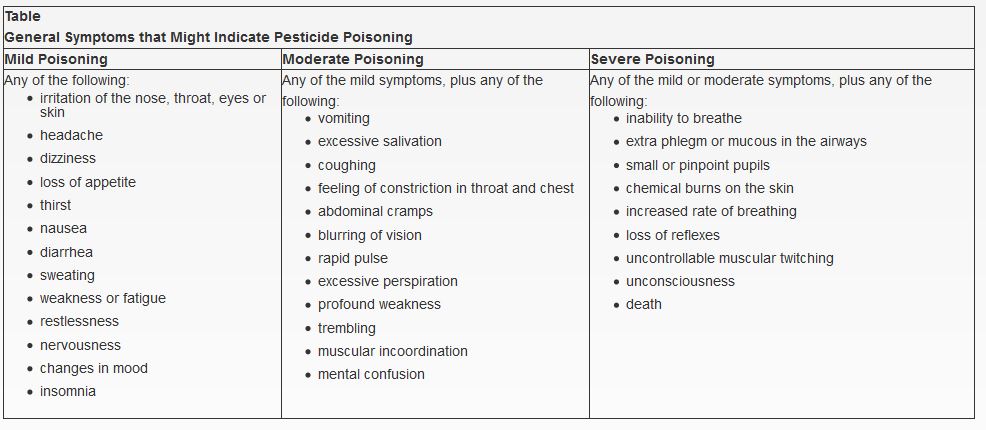Health effects are associated with pesticides:
Pesticides are designed to kill “pests”, but some pesticides can also cause health effects in people. The likelihood of developing health effects depends on the type of pesticide and other chemicals that are in the product you are using, as well as the amount you are exposed to and how long or often you are exposed.
Most often, pesticides affect the nervous system (system in your body that controls your nerves and muscles). General health effects from acute (short-term) exposures or poisonings are listed in the table below.
NOTE: The term “pesticide” describes a very large and diverse group of chemicals or products. It is very important to always get specific information about the exact product you are using.

Some health effects from pesticide exposure may occur right away, as you are being exposed. Some symptoms may occur several hours after exposure. Other effects may not be noticed for years, for example cancer.
Some symptoms of pesticide exposure will go away as soon as the exposure stops. Others may take some time to go away. For people exposed to pesticides on a regular basis, long-term health effects are a concern.
Women who are pregnant or breast-feeding should check with their doctors before working with pesticides as some pesticides may be harmful to the fetus (unborn baby) or to breast-fed infants.
Certified pesticide applicators or people who work with pesticides are encouraged to have regular medical check-ups. Tell your doctor which pesticides you are working with and/or exposed to.
Pesticides enter our bodies:
Pesticides can enter your body during mixing, applying, or clean-up operations. There are generally three ways a chemical or material can enter the body:
- through the skin (dermal),
- through the lungs (inhalation), or
- by mouth (ingestion).
Dermal (absorption through skin)
In most work situations, absorption through the skin is the most common route of pesticide exposure. People can be exposed to a splash or mist when mixing, loading or applying the pesticide. Skin contact can also occur when you touch a piece of equipment, protective clothing, or surface that has pesticide residue on it.
Inhalation (through the lungs)
Inhalation may occur when working near powders, airborne droplets (mists) or vapours. The hazard from low-pressure applications is fairly low because most of the droplets are too large to remain in the air. Applying a pesticide with high pressure, ultra low volume, or fogging equipment can increase the hazard because the droplets are smaller and they can be carried in the air for considerable distances. Pesticides with a high inhalation hazard will be labelled with directions to use a respirator.
Ingestion (by mouth)
While ingestion (by mouth) is a less common way to be exposed, it can result in the most severe poisonings. There are numerous reports of people accidentally drinking a pesticide that has been put into an unlabelled bottle or beverage cup/container (including soft drink cans or bottles). Workers who handle pesticides may also unintentionally ingest the substance when eating or smoking if they have not washed their hands first.
Can people become allergic to pesticides?
Fortunately, few of the thousands of pesticides used today cause true allergies. This is because pesticides are tested for their potential to cause allergies prior to being put on the market. However, over time, an allergic reaction to some pesticides or chemicals used in the formulation of some pesticides can develop in some people.
There are two types of allergic sensitization: skin and respiratory. Symptoms of skin sensitization may include swelling, redness, itching, pain, and blistering. Respiratory sensitization symptoms may include wheezing, difficulty in breathing, chest tightness, coughing and shortness of breath. In some cases, respiratory sensitization can produce a severe asthma attack.
As the allergy develops, the reaction can become worse with each exposure. Eventually, even a short exposure to a low concentration of the pesticide can cause a very severe reaction. Although it is rare, it is important to be aware that pesticides may have the ability to cause life threatening allergic reactions in some people.

